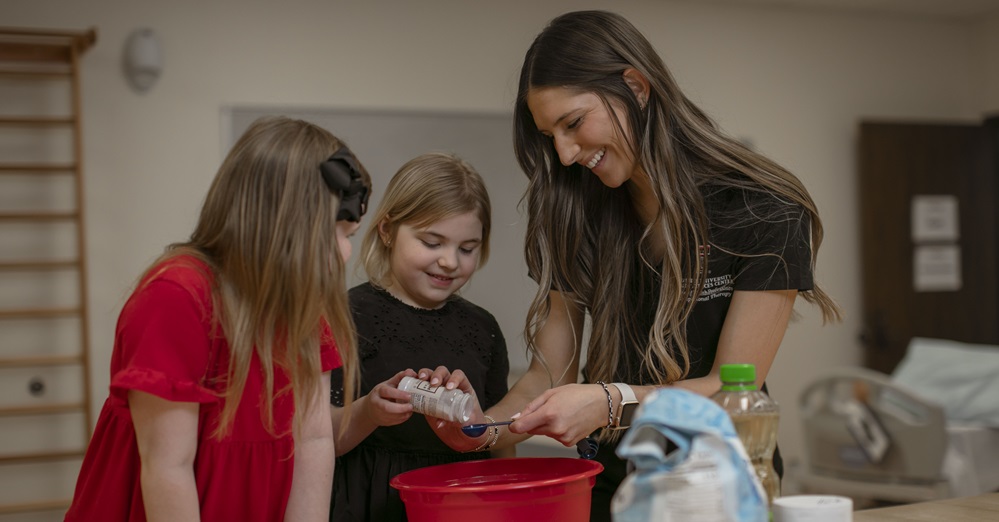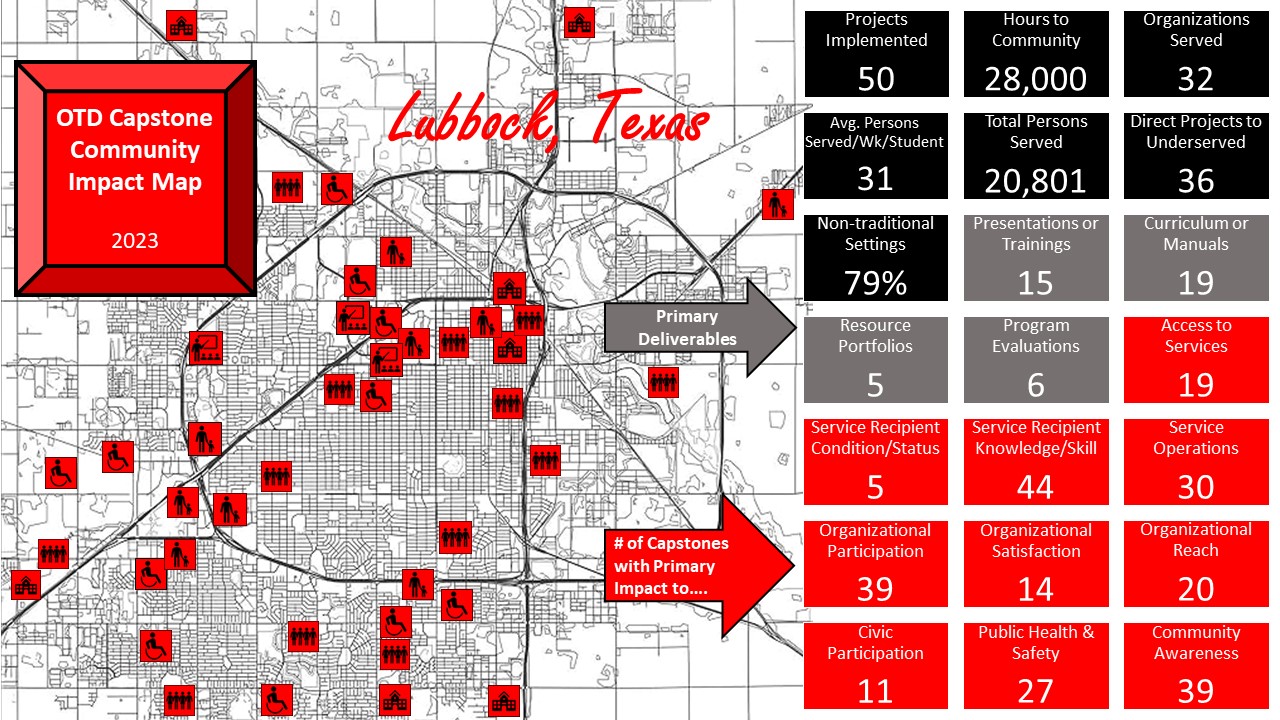A Closer Look at OT Capstone Experience

Laurie Stelter, OTR, PhD, assistant professor and the doctoral capstone coordinator for the Occupational Therapy Program at TTUHSC, manages the capstone experiences for 50 students in their final semester.
The TTUHSC Occupational Therapy (OT) program’s doctoral capstone students demonstrate meaningful impact to the health and well-being of the Lubbock area during the completion of their 14-week, full-time immersion experiences within over 30 community-based, educational and traditional practice settings. Each year, the OTD capstone results in approximately …
- 50 project deliverables
- 28,000 service hours
- 20,000 persons served
- 36 projects delivered directly to underserved populations.
We sat down with Stelter to learn more about the success of this program and its doctoral capstone experience.
Capstone “Experience”
While the capstone does require a final “project,” if you will, it is better deemed an “experience.” From start to finish, the Occupational Therapy program offers and encourages students opportunities to evaluate the direction for their capstone, and ultimately their career, post-graduation.
Each student has to complete this capstone in the doctoral level Occupational Therapy program. According to Stelter, students develop an individual plan for what they will learn or deep dive into regarding OT. Then, they partner with a community site, where they work full time hours for 14 weeks, immersing themselves in the mission of the organization. At the culmination of that, they complete the project component where they develop their deliverables and present what they learned at the scholarship symposium.
Throughout their time in the program, students take four courses that will guide them in developing what plan (or route) they want to take and what site (or organization) best fits their interests. They do a needs assessment and literature review around the topic and get field work experiences. Then, that last semester, they complete the 14 week capstone experience.
Stelter shares that students are able to choose from several capstone focus areas (what specific skills they’re wanting to develop) such as:
- Program development
- Education
- Advocacy
- Leadership administration
- Research
- Practice
They also identify a more specific topical inference, in terms of certain populations or settings they may want to work with/in. For example, she says there are usually a handful of students that are more focused on children and disabilities, or even adults with disabilities - physical, intellectual, cognitive or mental health disabilities. But there may also be another group trying to meet a social health type of need like populations with low socioeconomic backgrounds or populations that are stigmatized in any way. Stelter helps students partner with a local site that fits each particular audience or need.
“We choose to focus all of our capstone experiences in Lubbock, which is somewhat unique amongst other doctoral programs,” Stelter says. “Our program was very intentional in localizing experiences because we wanted to have a more targeted impact in our community.”
An impact that she says is across the board for the students, organizations they work for, individuals receiving care, and the community.
Measurements of Impact

Outcomes of our impact are collected in three main areas:
- Community - Were the students able to build community-wide awareness or improve access to service?
- Organization - How was that organization impacted (i.e. service delivery process)? Is new programming being implemented, or is existing programming being enhanced?
- Individual service recipient - Are skills, general health, access to care, and well being improved?
- Student - Have they learned how to develop and evaluate programs, build an advocacy project, or become a future educator? They should be building those particular skill sets as they’re working on this project.
“I pull together all of that information across all 50 students and show the broad impact across the capstone program,” she says.
Stelter also evaluates the impact past graduation. Are there signs that some of that fruit is moving forward? She looks at students that go on to work in a particular area that is the same or similar to their capstone, or evaluates if students presented at conferences or other venues connected with what they focused on during capstone.
“We had one student whose focus area was leadership and administration, and he built a business plan for an OT hand clinic,” she said. “During his capstone, he worked with an organization that had a very similar business model. He developed his business plan, and less than a year after graduation, he has already implemented and has his own clinic up and running.”
She goes on to share that another student that completed her capstone with the Anatomy Institute was hired after graduation as adjunct faculty to help with gross anatomy, while other students have partnered with faculty to present at national and state conferences.
Overall, the success of the capstone course is due to a secret sauce that TTUHSC has mastered across the organization - a synergistic relationship between passionate programs like this one, faculty and students, and a supportive local community.
Related Stories
TTUHSC Receives $1 Million Gift from Amarillo National Bank to Expand and Enhance Pediatric Care in the Panhandle
TTUHSC School of Medicine leaders accepted a $1 million philanthropic gift from Amarillo National Bank on Tuesday (Feb. 10), marking a transformational investment in pediatric care for the Texas Panhandle.
Texas Tech University Health Sciences Center Permian Basin Announces Pediatric Residency Program Gift
TTUHSC Permian Basin, along with the Permian Strategic Partnership and the Scharbauer Foundation, Feb. 5 announced a gift that will fund a new pediatric residency.
The Ph.D. Programs that Shape Health Care
The Graduate School of Biomedical Sciences Ph.D. programs at TTUHSC provide the foundation, mentorship and research opportunities you need to pursue groundbreaking work.
Recent Stories
The John Wayne Cancer Foundation Surgical Oncology Fellowship Program at Texas Tech University Health Sciences Center Announced
TTUHSC is collaborating with the John Wayne Cancer Foundation and has established the Big Cure Endowment, which supports the university’s efforts to reduce cancer incidence and increase survivability of people in rural and underserved areas.
TTUHSC Receives $1 Million Gift from Amarillo National Bank to Expand and Enhance Pediatric Care in the Panhandle
TTUHSC School of Medicine leaders accepted a $1 million philanthropic gift from Amarillo National Bank on Tuesday (Feb. 10), marking a transformational investment in pediatric care for the Texas Panhandle.
Texas Tech University Health Sciences Center Permian Basin Announces Pediatric Residency Program Gift
TTUHSC Permian Basin, along with the Permian Strategic Partnership and the Scharbauer Foundation, Feb. 5 announced a gift that will fund a new pediatric residency.
